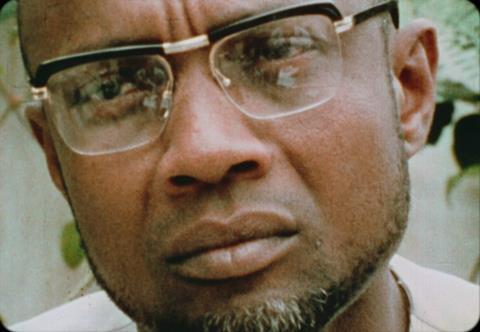IDFA premiere uses archive footage and Cabral’s personal writings to paint a compelling portrait

Dir: Miguel Eek. Spain/Portugal/France/Sweden/Cape Verde. 2025. 87mins
Agronomist, political theorist and revolutionary Amilcar Cabral led the first resistance movement in sub-Saharan Africa to successfully achieve independence from a colonial power through armed struggle. But Spanish documentarist Miguel Eek is interested not just in Cabral the guerilla, who fought to liberate Guinea-Bissau from Portuguese rule; using his subject’s own political writings and poems, as well as personal latters, he also sheds light on Cabral the man. Politics, verse and personal reflections intertwine and cross-fertilise in this fascinating, thoughtful picture of a complex soul – whose most prominent cinematic presence to date was as a tutelary spirit in Chris Marker’s experimental 1983 documentary Sans Soleil.
Fascinating, thoughtful picture of a complex soul
Picked up by Odd Slice Film Sales shortly before its debut in IDFA’s Envision competition, Amilcar looks set to score more festival engagements before finding a berth on a specialized streaming platform. Theatrical engagements may also follow: the impressionistic location-shot bridging sequences that connect the film’s segments of archive footage give Amilcar a real cinematic quality, as does the use of a haunting recurrent musical theme, Earth Horns with Electric Drone, by Japanese sound artist and Fluxus Group member Yoshi Wada.
Amilcar would make a good double bill with Johan Grimonprez’s Oscar-nominated 2024 documentary Soundtrack To A Coup d’Etat. Both are portraits of pioneering anti-colonialist leaders who were assassinated when they threatened existing colonial power blocs and the allies that profited from their plundering of African resources. Both work by exhuming a long-buried injustice in ways that feel fresh. Eek gives us no narrative context for Amilcar’s flow of filmed archive material and present-day footage of locations, apart from Cabral’s own words and a pair of brief TV interviews. These stand in stark contrast with reports from the archives of the infamous Portuguese security agency PIDE, interleaved into the flow of the film, on a man who the colonial authorities considered to be a dangerous subversive.
With a lack of xplanatory captions or voice-over narration, the only contextual pointers outside of Cabral’s words (evocatively spoken by Cape Verdean filmmaker Nuno Miranda) and those PIDE reports are date and place titles, from the first, ‘Island of Sao Vicente, Cape Verde, Portuguese Colony, 1943’, to the last, ‘Conakry, Guinea-Conakry, Independent Republic, 1973’. Those unfamiliar with Portuguese colonial history may take a while to work out that the Atlantic islands of Cape Verde and the West African territory known as Guinea-Bissau had an umbilical connection created by shared Portuguese administration, forced population exchange and, historically, the slave trade.
It was Cabral’s navigation of this colonial triangle, charted in the film’s impressionistic first section, that forged his activism: born in Guinea-Bissau to Cape Verdean parents, he moved with them back to Cape Verde when he was eight, witnessing firsthand the devastating effects of a drought which the colonial rulers did nothing to alleviate. As a young man Cabral sailed to Lisbon to study agronomy (he was the only black student in his class), and finally returned to the land of his birth in 1952 to oversee an experimental agricultural station.
Cabral emerges as an idealist but also a leader who could be ruthless: in a letter to his first wife Maria Helena he talks about “eliminating” the leaders of rebel factions in the resistance movement he founded, before adding that he’s tired and needs to go back to bed. Elsewhere he’s in London at a conference; lauded by Castro in Havana; received by Ceausescu in Bucharest; hangs out with Olof Palme in Stockholm. It’s left to another of those stark PIDE reports – which are presented in silence on the screen for us to read and absorb – to inform us that Cabral was, in 1966, in a relationship with a Cape Verdean woman, Ana Maria.
Eek withholds information that a more conventional biographical documentary would have placed in tidy chronological order. We only discover Cabral has a daughter when he writes to tell her he loves her; later, he seems to have acquired a son too. There’s perhaps some fence-sitting here: as we only have Cabral’s words to go on, we never know to what extent his absences were selfish, or how much emotional turmoil he left behind.
What we do get is a deep dive into the mindset of a man consumed by a mission while struggling to stay grounded. At the same time, the bright future Cabral envisaged for Guinea-Bissau, Cape Verde and Africa comes across here as a kind of dream vision, one that is both inspiring and, like much of the archive footage here, an unreachable relic of the past.
Production companies: Mosaic, LX Filmes, Les Docs du Nord
International sales: Odd Slice Films, info@oddslicefilms.com
Producers: Miguel Eek, Luis Correia, Marie Dumoulin
Screenplay: Miguel Eek, Alba Lombardia
Editing: Federico Delpero Bejar
Cinematography: Joao Pedro Placido
























